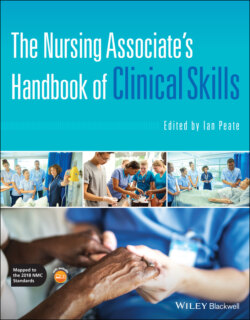Читать книгу The Nursing Associate's Handbook of Clinical Skills - Группа авторов - Страница 54
Take Note
ОглавлениеCaring cannot exist without the sharing of information and feelings, and the very close relationship between the nursing associates and their patient is no different. To establish this close relationship requires that the nursing associate be able to confidently display interpersonal and relationship skills in all aspects of care.
The key components of a therapeutic relationship are unique, never time dependant (a brief meeting, or a relationship that extends through time) and are centred around the patient to support and enhance healing and functioning, what Peplau in 1991 described as ‘professional closeness’. These components include the following:
Respect
The Dignity Challenge Framework (Health and Social Care Information Centre 2010) identifies respect as ‘the need to support people with the same respect you would want for yourself or a member of your family’. Respect implies a recognition of the individual as they are, engaging in an open and non‐judgemental attitude to those in your care.
The Essence of Care document (Department of Health 2010) benchmarks for respect and dignity provide best practice guidance to ensure people (clients, patients and carers) experience care that is focused upon respect and encompasses their values, beliefs and personal relationships. The 2015 National Health Service (NHS) Constitution for England states:
We value every person – whether patient, their families or carers, or staff – as an individual, respect their aspirations and commitments in life, and seek to understand their priorities, needs, abilities and limits. We take what others have to say seriously. We are honest and open about our point of view and what we can and cannot do. (National Health Service 2015)
